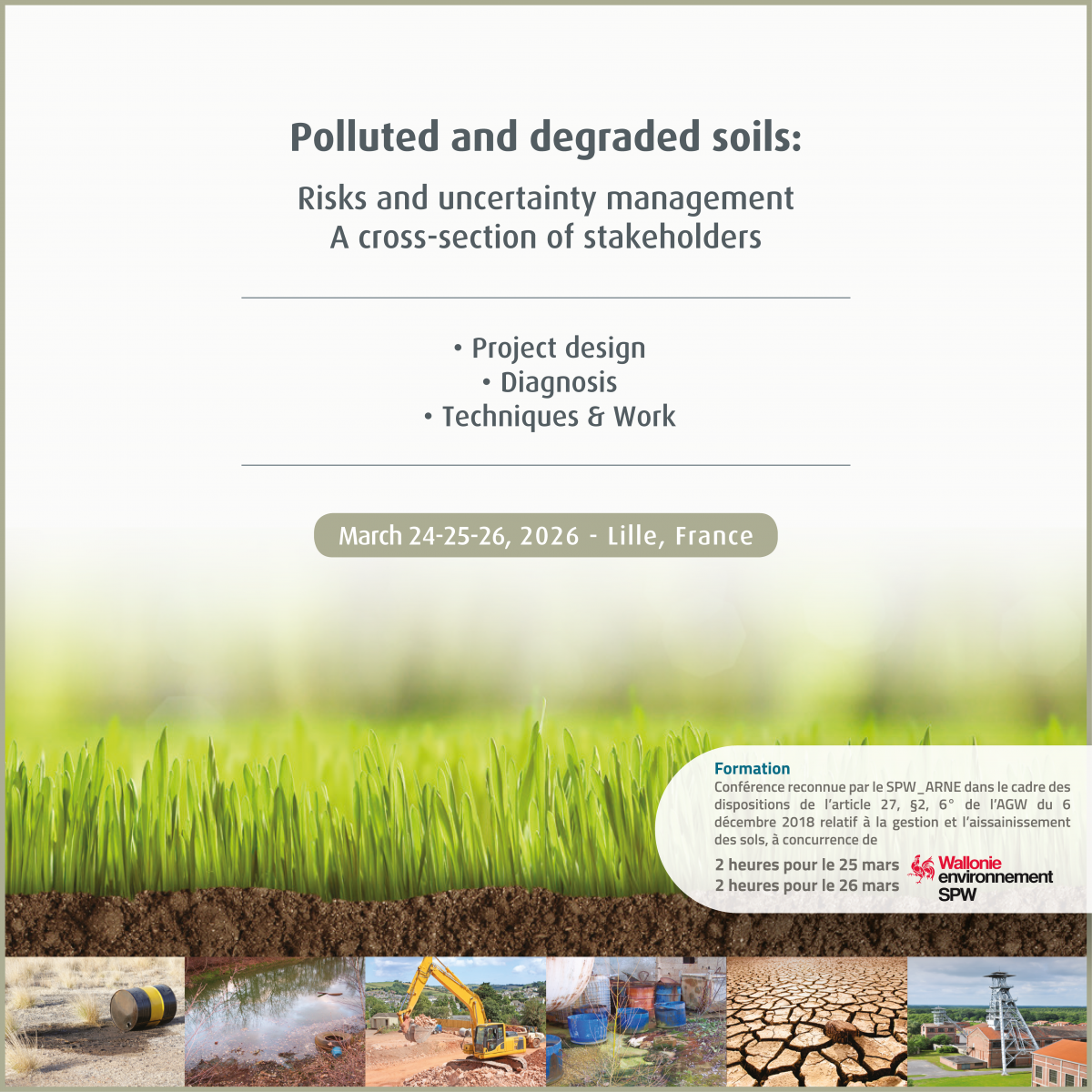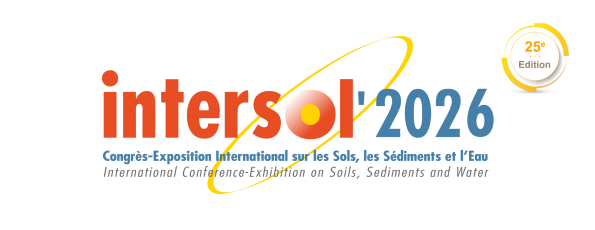

Partners
Ondernemingen
Instellingen
Wetenschappelijk comité
- Algis Maxime
LISIS - Aubert Jean-Pierre
Terres de Métamorphoses - Barthès Amélie
SGS - Bossert Frédéric
Züblin Umwelttechnik - De La Hougue Christel
UPDS - Dechesnes Laurent
Cluster Eau-Milieux-Sols - Denot Agathe
Cerema - Devic-Bassaget Boris
SARPI Remediation France - Diaz Vanegas Camila
Ramboll - Eisenlohr Laurent
Cerema - El Fadili Saïd
Bruxelles Environnement - Entresangles Sandra
Hydreka - Fehlauer Till
NGE - Garnier Romain
Cluster Eau-Milieux-Sols - Godain Alexiane
Tauw - Goulian Erwan
Evonik - Grand Cécile
Ademe - Gris Alexis
Apave - Hanot Cédric
2TER - Janus Adeline
Energipole - Karg Frank
HPC International - Karimi Battle
Novasol Experts - Klein Pierre-Yves
Estralab - Lallahem Sami
Ixsane - Lanoy Laurence
Laurence Lanoy Avocats - Le Roy-Gleizes Carine
UGGC Avocats - Lemal Laure
Ginger Burgeap - Limousin Vincent
Webs - Machinet Gaylord
Microhumus - Martelain Jacques
Terraquatron - GESDEC - Michault Delphine
TerraIndex - Michel Julien
Ineris - Mourard Sylvain
Mérieux NutriSciences - Nsonda Christian
Axelera - Oudin Philippe
Semaco Environnement / Mines de Nancy - Pacaud Olivier
Brézillon - Pauget Benjamin
Tesora - Pichon Claire
Agrolab - Pommier Thomas
Setec Energie Environnement - Rognon Amélie
Ortec Group - Sénéchaud Jonathan
Colas Environnement - Sibourg Olivier
Ramboll - Soussou Souhir
Fertil'Innov - Texier Jérôme
XSEM - Thannberger Laurent
Valgo - Vague Maurice
MVCS Conseil - Valet Jean-Marc
Geocarta - Vergnerie Marie-Léonie
Fieldfisher - Verstraete Stéphane
Brownfield Academy / DC Environment
Samenvatting
Polluted and degraded soils: risk and uncertainty management
A cross-section of stakeholders
This year's Intersol will focus on sharing experience
in managing the risks of anthropised soils. A wide range of players and
stakeholders are expected to attend, including elected representatives and
government departments, project owners, design offices and construction
companies, experts, analysis and testing laboratories, public and private
research, etc.
All are invited to talk about their risk assessment and management methods:
· Financial,
· Legal and contractual,
· Health,
· Environmental,
· Technical,
· On site,
· Innovation-related,
· Data collection and associated uncertainties,
· Image-related,
· or as part of communication to a variety of audience.
This feedback can be broken down into the four sessions below, corresponding to
the different phases of a project: Project design, Diagnosis, Work, Acceptance and monitoring.
And following the success of this initiative set up during the previous editions, a special session dedicated to young researchers - in the course of their doctorate or young doctor, creators of innovation, start-ups, will be organized during the event. The work presented in the form of pitches will be linked to the 4 themes of the congress.
Show us your innovative skills!
For 3 days, Intersol is a unique opportunity to meet the players at the heart
of these developments, with whom you can exchange ideas, while benefiting from
a wide range of professionals who will be there to listen to you.
So respond to this call for applications, because we want to hear from you!
Thema's
▬ 5 major themes ▬
1- Project design
Projecting uses and defining clear development objectives, budgets and deadlines to anticipate, assess and control environmental impacts in order to guarantee
user safety and the long-term future of the development.How to manage the risks associated with anthropised soils when defining development scenarios, in order to plan uses and secure the legal, financial,
health and environmental aspects of projects.2- DiagnosisThe first essential stage in taking stock of the issues at stake (pollution, soil functionality, biodiversity, resources) in order to guide targeted, effective and
sustainable management actions.
3- Work
Implementation of technical solutions to treat, contain or secure pollution, and to reuse or revalue degraded resources in order to guarantee sustainable
rehabilitation of the environment and control of environmental risks.
4- Acceptance and monitoringVerification that contractual or regulatory objectives have been met, that the work carried out is effective and that the site's health and environmental safety
conditions are maintained over time.5- Innovation: young researchers / creators / startups sessionAll research themes related to the the different sessions are expected
Young innovative companies, Doctoral students, Young doctors....
This special session will be an integral part of the program. The presentations will be made at the speaker's choice in the form of pitches or conferences
Please let us know if you would like to share your experience as part of a round table discussion.
Important!
Contributions will be selected based on:
✧ their ability to present feedback on one or several use cases
✧ highlighting their novelty or improvement in relation to existing knowledge
✧ the technical, economic, energy, environmental and social context
✧ the prospects considered and their justification
✧ their ability to present feedback on one or several use cases
✧ highlighting their novelty or improvement in relation to existing knowledge
✧ the technical, economic, energy, environmental and social context
✧ the prospects considered and their justification
To be considered, your application must be sent necessarily with:
- Title of the presentation in French and in English
- A summary in French or in English
